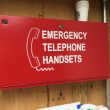Legislative proposal for D Block released
A consortium of public-safety organizations are supporting proposed legislation released recently that would allocate the 10 MHz D Block in the 700 MHz band to public safety, although the spectrum currently is earmarked for use by commercial wireless operators.
“A consensus group of public-safety organizations have all signed off on that legislation,” said Chris Moore, chairman of the spectrum working group for the Major Cities Chiefs Association. “The idea was to provide enough flexibility in a revised law that would all the FCC to accomplish those things which we all had agreed to in April and May.”
Moore was referring to an ad-hoc committee of eight public-safety organizations that met during the spring. In addition, Association of Public-Safety Communications Officials (APCO), the National Public Safety Telecommunications Council (NPSTC) and the Public Safety Spectrum Trust (PSST) — the nationwide licensee to the 10 MHz of public-safety broadband spectrum adjacent to the D Block — have endorsed the notion that the D Block should be reallocated to public safety and that LTE should be the technology to be used in the spectrum.
The National Emergency Number Association (NENA) has endorsed the LTE technology choice but has taken a different position on the D Block spectrum. NENA has proposed that the D Block and the public-safety broadband spectrum be auctioned to a commercial operator, with proceeds from the auction being used to fund broadband access for public safety.
In addition to allocating the D Block to public safety, the proposed legislation would allow the licensee — currently the PSST — to lease access to the spectrum to public-safety entities to build and operate networks that would fit into the national framework, as more than 10 entities have requested permission to do in waivers filed with the FCC during the past year.
A final aspect of the proposed legislation calls for Congress to have the FCC adopt rules that would provide a means of fully funding the operations of the national public-safety broadband licensee. Currently, the PSST has no way to generate revenue and no assets other than a license to the 10 MHz swath of 700 MHz spectrum.
During a congressional hearing last week, FCC Chairman Julius Genachowski said he plans for the commission to develop a plan for the D Block when the agency provides Congress with its broadband plan in February.

















